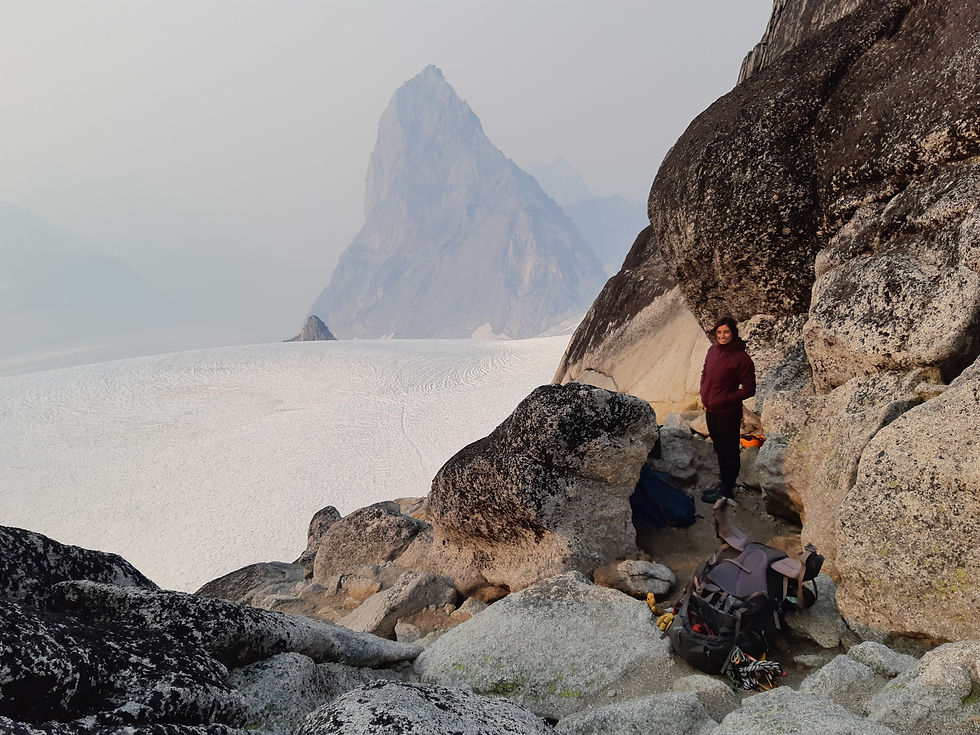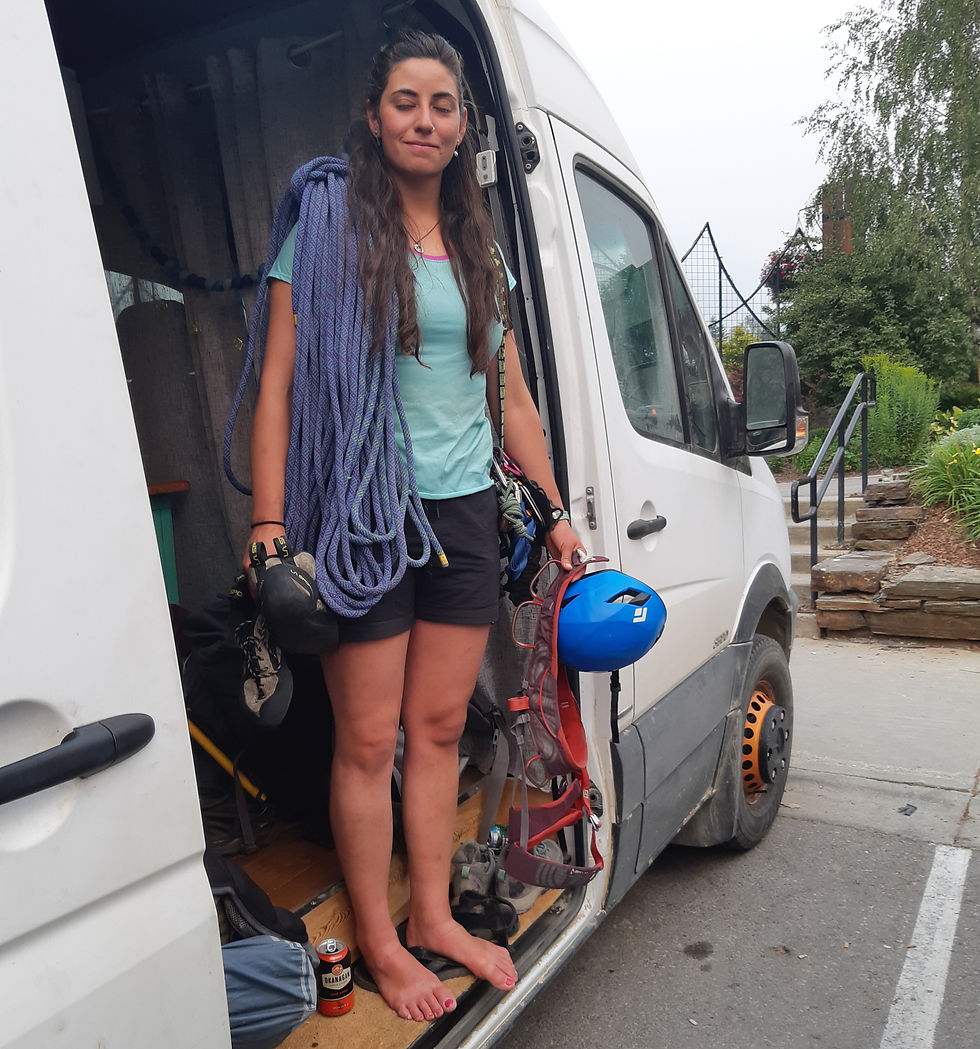The Darkness: Having a Hard Time Living the Good Life (in the Outdoor Adventure Sphere)
- kara4479
- Dec 10, 2024
- 7 min read
Updated: Mar 14
Do you ever feel this way? You know, like you want to jump out of your skin? You’re so restless, you wonder if the only remedy is hitting the climbing gym super hard for hours and climbing until you literally can’t hold onto the wall anymore? You go home only because your hands no longer work, you eat and still feel so restless you wonder if you should go for a 3 hour run on the icy sidewalk in the dark? You wonder if anyone will ever love you despite these moods you get into. No matter how much therapy, or journalling, or meditation you do, no matter how much space there is between the down swings and how much hope you may be free from “relapse,” these moods just come back again and again. “The Darkness”, I call it. It used to be vague, ambiguous, and ultimately scary. Something I could not understand or control. Something that could eat me alive without warning, consuming all light, joy, any hope of consistency or partnership and sucking it into its black hole of despair and emptiness.

The Darkness destroyed me a couple summers ago when I was living in Squamish (and in the Bugaboos). I’d just finished my Master’s and a lucrative season of tree planting in northern BC. I was living in a van with my climbing partner and we had big dreams of climbing our way through North America. “Living the dream,” some may have thought, at least according to my Instagram, but something was just not right. “I was having a hard time living the good life,” I used to think, a line from a Grateful Dead song called High Time. There was this big, burning Darkness living in my core, dragging any semblance of happiness, connection, fulfillment and feeling into its unfathomably bottomless depths. I was exhausted, feeling like I had one hand constantly tied up in wrestling The Darkness down, while the other hand tried desperately to maintain all of my regular functioning. I was living in such close quarters with someone whom I was constantly trying to appease, spending time hoping to fit in with new friends and some cliche climbing stereotype, attempting to keep a long distance boyfriend emotionally satisfied, and all the while perilously holding the pieces of myself together with the precariousness of a dry-tooler’s golf glove, stitched haphazardly together with dental floss. Climbing felt altogether impossible, I was sinking so much energy into keeping everyone around me content and also keeping this Darkness at bay. I moped around quietly hiding this struggle, hoping no one would notice, praying for some time alone to suffer freely without affecting anyone else. I survived by going to sleep in the centre of the party (literally, the party was in our van, but my bed was also in our van), living for my morning coffees, wanting painfully to go climbing, but feeling the weight of all my tree-planting injuries and the fear that I’d never be good enough or I just couldn’t measure up. This inner tension culminated one fateful night at a lake accessed by a long backroads drive, half-way between Squamish and Whistler. I recall lying in my friend’s van alone, violently crying like I was puking tears from my eye sockets, calling my brother over and over again until he picked up and reasoned with me, “it’s time to come home.”

Since then, I’ve spent a lot of time trying to get to know The Darkness with fervent intention in order to reduce the fear associated with it. Sort of like in climbing, when you get to know something, the beta, the movements, the feeling of the forsaken fall, it becomes less scary. You can form shapes in the space that uncertainty, or ambiguity held. The Darkness becomes manageable and almost like a useful tool telling you there was something in that space you needed to figure out, to shed some light on. I recently learned that depression, or my Darkness, is actually an evolutionary trait, a biological function rather than dysfunction. Depression is an evolved adaptation where painful feelings force us to focus intensively on complex problem solving behavior (seriously, this is from a scientific paper by Andrews and Anderson Thomson 2009, with a million other references if you feel like science-ing. See reference below). Let me walk you through this as least science-y as possible. Negative emotion is actually a necessary stress response to challenges in our environment. As living organisms, humans have limited energetic resources that we need to allocate to survival (for example, attention to what’s around us, eating, social interaction, physical activity, etc.) so our processing resources would not naturally be used for sitting around wondering what the fuck might be wrong with us. Here is where depression comes in. It is actually meant to make us uninterested in these distracting survival activities and stimuli so we can prioritize concentrating on our negative emotions, analytical reasoning and attention to detail to figure out what in our environment is the triggering problem. The tradeoff is the ability to pay attention to anything else, kind of like a fever when you are sick. Fevers evolved as a stress response to infection. Having a fever creates impairments like making you exhausted with little energy for important survival functions (eating, work, sex, and relationships) because all of your resources are focused on trying to fight the illness and heal you. These impairments are the tradeoffs accepted by our bodies so we can produce an effective response to the illness. The Darkness is like a fever. It causes me to lose motivation for relationships, partying, eating, stretching, climbing sometimes, etc. so my analysis skills can be heightened, and all of my resources focused on “ruminating”, or figuring out what is not right so I can understand the issue at hand and make improvements (Andrews and Anderson Thomson 2009).
This may seem straightforward indeed, but one side-point I think many of us can relate to that affects the necessary rumination is avoidance. It totally checks out that avoiding pain is a survival technique because in many cases, pain provokes us to react quickly to prevent damage. For example, when you touch something hot and move your hand away, you are less likely to get burned. So, it makes sense that we would be highly motivated to reduce these painful depression feelings as fast as possible (Andrews and Anderson Thomson 2009) and we are lucky (or unlucky) to live in a time where we have access to a plethora of fantastic avoidance techniques that temporarily ease the agony without having to do actual work on the ‘complex triggering problem’. You know what I’m taking about, the tv, alcohol, drugs, sex, Instagram/TikTok/Facebook whatever, Duolingo (for fuck’s sake), excessive and unproductive physical activity, comfort food, excessive and unproductive coffee consumption… The list could really go on and on. When I look back, I realize that during my time in Squamish, I sunk so much energy into trying to relieve the pain using these vices - climbing, running, social interaction, pure stubborn commitment to a dream and a person, slacklining, coffee - anything that would take a bit of the pain away, instead of hunkering down, spending time alone, and trying to just figure out what was not right. Sometimes the solution is difficult to enforce, it may mean breaking a commitment (like a marriage in some cases) or grieving a dream. Sometimes it’s just easier to avoid the problem than to address it head on. Ultimately, what will happen is that the Darkness will build up inside you and explode yelling, “PAY ATTENTION TO ME,” until you have no choice but to surrender to its needs, make the tough decisions and relieve it (and you) of its agony.

In Squamish, The Darkness was putting in its damndest efforts to squeeze me out of a situation that was entirely wrong for me. The restlessness was an indicator that something was, in fact, not right. I was in the wrong place with the wrong person and really, everything was just wrong. I learned that when your body is trying to tell you something, listen, it’s actually a biological adaptation that has kept your species alive for millions of years. You may be wondering, why did I fight it? Well, what held me in Squamish was commitment to a naive dream that I was not equipped for, the mountains, and accessibility to what felt like unlimited climbing opportunities. I learned that physical activity alone cannot heal a troubled mind and when movement becomes excessive, it’s avoidance. Now, a year and a half later with a lot of focused time spent learning myself in between, I am living in Bozeman, Montana, in a lovely house with my own room to escape to, wonderful housemates and a supportive community of friends and climbers. My current objective, ice climbing and filming a dry-tooling documentary. I am not in the challenging, taxing situation I had accepted in Squamish, so why am I feeling like I want to jump out of my skin? What is The Darkness trying to tell me this time? In the words of again, the Grateful Dead, in New Speedway Boogie, “one way or another this darkness got to give”. I know now that the key is to focus on it, find enjoyment in the rumination period, and learn from whatever lesson I’m in for this time.
Reference: Andrews, P. W., & Thomson, J. A., Jr. (2009). The bright side of being blue: Depression as an adaptation for analyzing complex problems. Psychological Review, 116(3), 620–654. https://doi.org/10.1037/a0016242, accessed from https://www.ncbi.nlm.nih.gov/pmc/articles/PMC2734449/

Commentaires